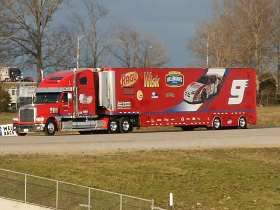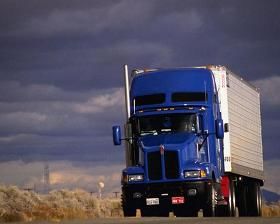Experienced Driver Looking To Upgrade
Topic 6045 | Page 1

I would suggest school or a company training program. Problem with doing it yourself is finding a job after you get the CDL. Very few companies will hire you without you having attended a 160 hour program at a school.
CDL:
Commercial Driver's License (CDL)
A CDL is required to drive any of the following vehicles:
- Any combination of vehicles with a gross combined weight rating (GCWR) of 26,001 or more pounds, providing the gross vehicle weight rating (GVWR) of the vehicle being towed is in excess of 10,000 pounds.
- Any single vehicle with a GVWR of 26,001 or more pounds, or any such vehicle towing another not in excess of 10,000 pounds.
- Any vehicle, regardless of size, designed to transport 16 or more persons, including the driver.
- Any vehicle required by federal regulations to be placarded while transporting hazardous materials.

I would suggest school or a company training program. Problem with doing it yourself is finding a job after you get the CDL. Very few companies will hire you without you having attended a 160 hour program at a school.
Pretty much this. Also in terms of a company school think of it as a long interview and impress them.
CDL:
Commercial Driver's License (CDL)
A CDL is required to drive any of the following vehicles:
- Any combination of vehicles with a gross combined weight rating (GCWR) of 26,001 or more pounds, providing the gross vehicle weight rating (GVWR) of the vehicle being towed is in excess of 10,000 pounds.
- Any single vehicle with a GVWR of 26,001 or more pounds, or any such vehicle towing another not in excess of 10,000 pounds.
- Any vehicle, regardless of size, designed to transport 16 or more persons, including the driver.
- Any vehicle required by federal regulations to be placarded while transporting hazardous materials.
Knowing how to get along with people will go a long way... even if you don't feel like it. One weird thing about being over the road is you might not be around anyone for days, then the next thing you know you're right in the middle of workplace drama.
Over The Road:
Over The Road
OTR driving normally means you'll be hauling freight to various customers throughout your company's hauling region. It often entails being gone from home for two to three weeks at a time.
OWI:
Operating While Intoxicated

Welcome to the forum Jay.
As Max said, if you're looking to go OTR , then that means that you'll need to go the school route - whether company or private. Since mostly just the mega carriers will hire somebody without prior OTR experience (even if you have other driving experience), they use the 160 hour school program as a sort of experience in lieu of OTR. Most OTR companies require the 160 hour mark, but you'll want to verify with each company you chat with. They normally don't care if it's through their own school or a private school, as long as you meet a certain amount of hours. Anything under 160 is probably gonna cause you problems - and yes, there are some private schools out there that are below this, be aware. But simply put, if you wanna go OTR without prior OTR experience, you'll need to go to trucking school. If you try for your CDL A on your own, you won't be hire-able with the majority of the big carriers w/o any OTR experience - in fact, probably none of them would hire you. That's the reality of it. Even if you have prior driving experience with a Class B etc. You might be able to find a mom and pop outfit that would hire you, but that's only if you know somebody.
So, company-paid schooling or private schooling. Your choice.
Going the company route guarantees you've met their requirements, and you'll have a job waiting with them as soon as you complete their training successfully. Going private gives you more flexibility, just get pre-hires to make sure that the companies you're interested in will hire from your school and accept the curriculum. In fact, if you have certain companies you definitely are interested in, and you wanna go to a private school, verify that these companies will accept your private school(s) before you even enroll to save yourself some time and effort.
It might seem like a lot of info at first, but it's really not that hard. You'll have to do some research on your part. Most reputable private schools will be accepted by most mega carriers. Some carriers don't hire from certain private schools, which says nothing about the school's reputation, they just don't hire from certain schools. Going the company route will be cheaper (perhaps even "free"), but will require a greater sacrifice and limit you to said company.
If you haven't begun already, start taking advantage of the material on this website, and what we're saying to you will become more clear.
Best wishes to you.
CDL:
Commercial Driver's License (CDL)
A CDL is required to drive any of the following vehicles:
- Any combination of vehicles with a gross combined weight rating (GCWR) of 26,001 or more pounds, providing the gross vehicle weight rating (GVWR) of the vehicle being towed is in excess of 10,000 pounds.
- Any single vehicle with a GVWR of 26,001 or more pounds, or any such vehicle towing another not in excess of 10,000 pounds.
- Any vehicle, regardless of size, designed to transport 16 or more persons, including the driver.
- Any vehicle required by federal regulations to be placarded while transporting hazardous materials.
OTR:
Over The Road
OTR driving normally means you'll be hauling freight to various customers throughout your company's hauling region. It often entails being gone from home for two to three weeks at a time.
Pre-hire:
What Exactly Is A Pre-Hire Letter?
Pre-hire letters are acceptance letters from trucking companies to students, or even potential students, to verify placement. The trucking companies are saying in writing that the student, or potential student, appears to meet the company's minimum hiring requirements and is welcome to attend their orientation at the company’s expense once he or she graduates from truck driving school and has their CDL in hand.
We have an excellent article that will help you Understand The Pre-Hire Process.
A Pre-Hire Letter Is Not A Guarantee Of Employment
The people that receive a pre-hire letter are people who meet the company's minimum hiring requirements, but it is not an employment contract. It is an invitation to orientation, and the orientation itself is a prerequisite to employment.
During the orientation you will get a physical, drug screen, and background check done. These and other qualifications must be met before someone in orientation is officially hired.
Pre-hires:
What Exactly Is A Pre-Hire Letter?
Pre-hire letters are acceptance letters from trucking companies to students, or even potential students, to verify placement. The trucking companies are saying in writing that the student, or potential student, appears to meet the company's minimum hiring requirements and is welcome to attend their orientation at the company’s expense once he or she graduates from truck driving school and has their CDL in hand.
We have an excellent article that will help you Understand The Pre-Hire Process.
A Pre-Hire Letter Is Not A Guarantee Of Employment
The people that receive a pre-hire letter are people who meet the company's minimum hiring requirements, but it is not an employment contract. It is an invitation to orientation, and the orientation itself is a prerequisite to employment.
During the orientation you will get a physical, drug screen, and background check done. These and other qualifications must be met before someone in orientation is officially hired.
Company-sponsored Training:
A Company-Sponsored Training Program is a school that is owned and operated by a trucking company.
The schooling often requires little or no money up front. Instead of paying up-front tuition you will sign an agreement to work for the company for a specified amount of time after graduation, usually around a year, at a slightly lower rate of pay in order to pay for the training.
If you choose to quit working for the company before your year is up, they will normally require you to pay back a prorated amount of money for the schooling. The amount you pay back will be comparable to what you would have paid if you went to an independently owned school.
Company-sponsored training can be an excellent way to get your career underway if you can't afford the tuition up front for private schooling.
OOS:
When a violation by either a driver or company is confirmed, an out-of-service order removes either the driver or the vehicle from the roadway until the violation is corrected.
EPU:
Electric Auxiliary Power Units
Electric APUs have started gaining acceptance. These electric APUs use battery packs instead of the diesel engine on traditional APUs as a source of power. The APU's battery pack is charged when the truck is in motion. When the truck is idle, the stored energy in the battery pack is then used to power an air conditioner, heater, and other devices

Maverick used to hire drivers without any schooling background as long as a CDLA was in hand. Don't know if that's still the case. They have flatbed, reefers and specialized for hauling glass. Could be worth at least a phone call to find out details. Good luck to ya! Oh, one other thing, if you don't go the school route, you will still have to find a class 8 truck/trailer somewhere to use for the test and make sure that it is a stick shift, not an automatic (however, come to think of it, I believe that Maverick runs all automatics, so there you go! lol).
CDL:
Commercial Driver's License (CDL)
A CDL is required to drive any of the following vehicles:
- Any combination of vehicles with a gross combined weight rating (GCWR) of 26,001 or more pounds, providing the gross vehicle weight rating (GVWR) of the vehicle being towed is in excess of 10,000 pounds.
- Any single vehicle with a GVWR of 26,001 or more pounds, or any such vehicle towing another not in excess of 10,000 pounds.
- Any vehicle, regardless of size, designed to transport 16 or more persons, including the driver.
- Any vehicle required by federal regulations to be placarded while transporting hazardous materials.
Reefer:
A refrigerated trailer.

Thanks all! I really appreciate the feedback. I guess I've been just getting frustrated with the "telemarketers" that have been trying to recruit me to their schools. Most of them haven't even seen the inside of a truck. The most recent one especially. Which alone, wouldn't bother me but when I research them a bit, they don't seem very interested in answering my questions. If I'm not jumping on a bus for this week's class, I'm not worth the phone time I guess. I don't want to sign a contract and be pushed into a lease option on a truck...I've already been an owner. For now, I'm gonna continue my studying and see how the cards play out. I'm enjoying the review tests on this site anyway. Wish I would have found this site years ago. Thanks again for the help and the suggestions, I'll start looking into them today. Have a good one, all.

Jay M, I went the community college route. Even though it was four weeks long, there was only one week of sitting in a classroom.

I've been driving for a lot of years now. My experience is in rollbacks and wreckers, etc. I have experience in an old 10 spd we had for heavy jobs. I'm looking to upgrade to my "A" and go out on the road. I've towed and hauled everything from formula racing cars to rhinos for the zoo. The only problem is I don't like people all that much. Over the road sounds better all the time I have some questions. I've been reading all the opinions on company sponsored training and private school. Since I've been studying for a while now and have experience in D and C class commercial trucks for around 20 years, which option is best for me? I'm considering just finishing my testing and manuals and getting the license on my own. Not because I'm too good for schools or anything but I'm turning 40 this year and not that interested in going back to a classroom for weeks. Thoughts?
Hey man im kindof in the same boat as you ive been driving straight trucks for years and im preparing for A class trucking school. Im from Arkansas and ive spoken with recruiters at Maverick Trucking and they said if i get my A class cdl on my own even without OTR experience they will hire and train. And if you go to school on your own they will reimburse your schooling cost. Keep in mind they are all flatbed trailer haulers as far as I know. I think they mostly haul steel.
CDL:
Commercial Driver's License (CDL)
A CDL is required to drive any of the following vehicles:
- Any combination of vehicles with a gross combined weight rating (GCWR) of 26,001 or more pounds, providing the gross vehicle weight rating (GVWR) of the vehicle being towed is in excess of 10,000 pounds.
- Any single vehicle with a GVWR of 26,001 or more pounds, or any such vehicle towing another not in excess of 10,000 pounds.
- Any vehicle, regardless of size, designed to transport 16 or more persons, including the driver.
- Any vehicle required by federal regulations to be placarded while transporting hazardous materials.
OTR:
Over The Road
OTR driving normally means you'll be hauling freight to various customers throughout your company's hauling region. It often entails being gone from home for two to three weeks at a time.
Over The Road:
Over The Road
OTR driving normally means you'll be hauling freight to various customers throughout your company's hauling region. It often entails being gone from home for two to three weeks at a time.
Company Sponsored Training:
A Company-Sponsored Training Program is a school that is owned and operated by a trucking company.
The schooling often requires little or no money up front. Instead of paying up-front tuition you will sign an agreement to work for the company for a specified amount of time after graduation, usually around a year, at a slightly lower rate of pay in order to pay for the training.
If you choose to quit working for the company before your year is up, they will normally require you to pay back a prorated amount of money for the schooling. The amount you pay back will be comparable to what you would have paid if you went to an independently owned school.
Company-sponsored training can be an excellent way to get your career underway if you can't afford the tuition up front for private schooling.
New Reply:
New! Check out our help videos for a better understanding of our forum features

















Preview:








 TT On Facebook
TT On Facebook
I've been driving for a lot of years now. My experience is in rollbacks and wreckers, etc. I have experience in an old 10 spd we had for heavy jobs. I'm looking to upgrade to my "A" and go out on the road. I've towed and hauled everything from formula racing cars to rhinos for the zoo. The only problem is I don't like people all that much. Over the road sounds better all the time I have some questions. I've been reading all the opinions on company sponsored training and private school. Since I've been studying for a while now and have experience in D and C class commercial trucks for around 20 years, which option is best for me? I'm considering just finishing my testing and manuals and getting the license on my own. Not because I'm too good for schools or anything but I'm turning 40 this year and not that interested in going back to a classroom for weeks. Thoughts?
Over The Road:
Over The Road
OTR driving normally means you'll be hauling freight to various customers throughout your company's hauling region. It often entails being gone from home for two to three weeks at a time.
Company Sponsored Training:
A Company-Sponsored Training Program is a school that is owned and operated by a trucking company.
The schooling often requires little or no money up front. Instead of paying up-front tuition you will sign an agreement to work for the company for a specified amount of time after graduation, usually around a year, at a slightly lower rate of pay in order to pay for the training.
If you choose to quit working for the company before your year is up, they will normally require you to pay back a prorated amount of money for the schooling. The amount you pay back will be comparable to what you would have paid if you went to an independently owned school.
Company-sponsored training can be an excellent way to get your career underway if you can't afford the tuition up front for private schooling.